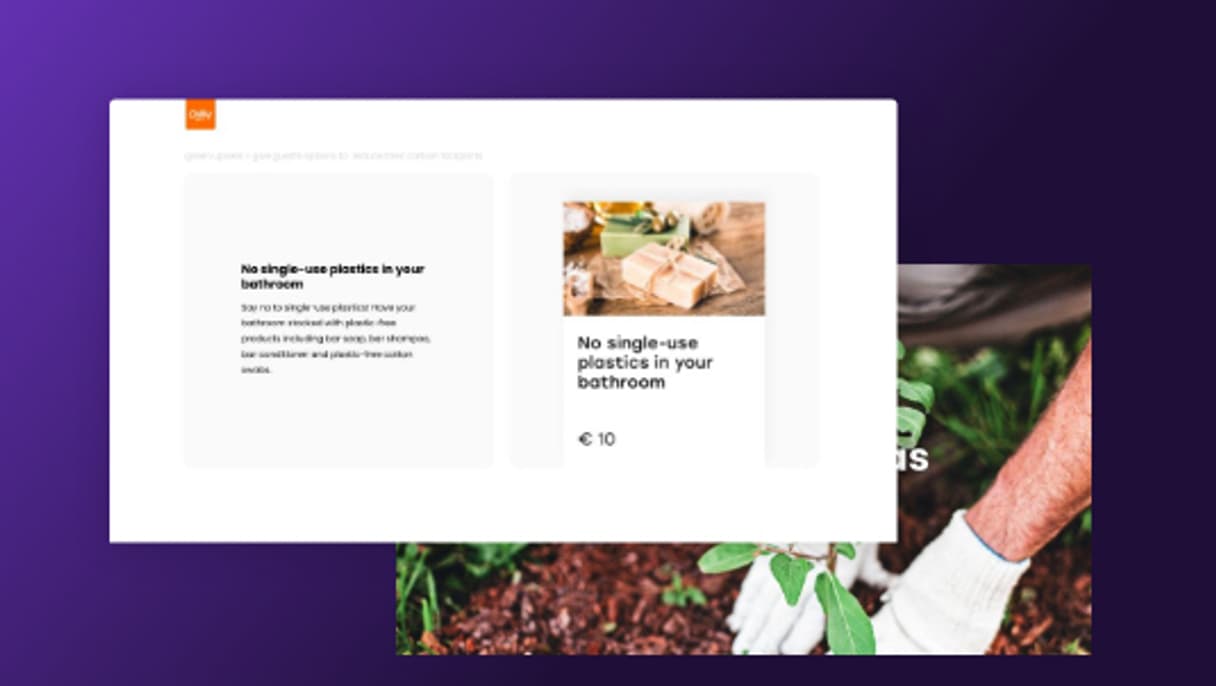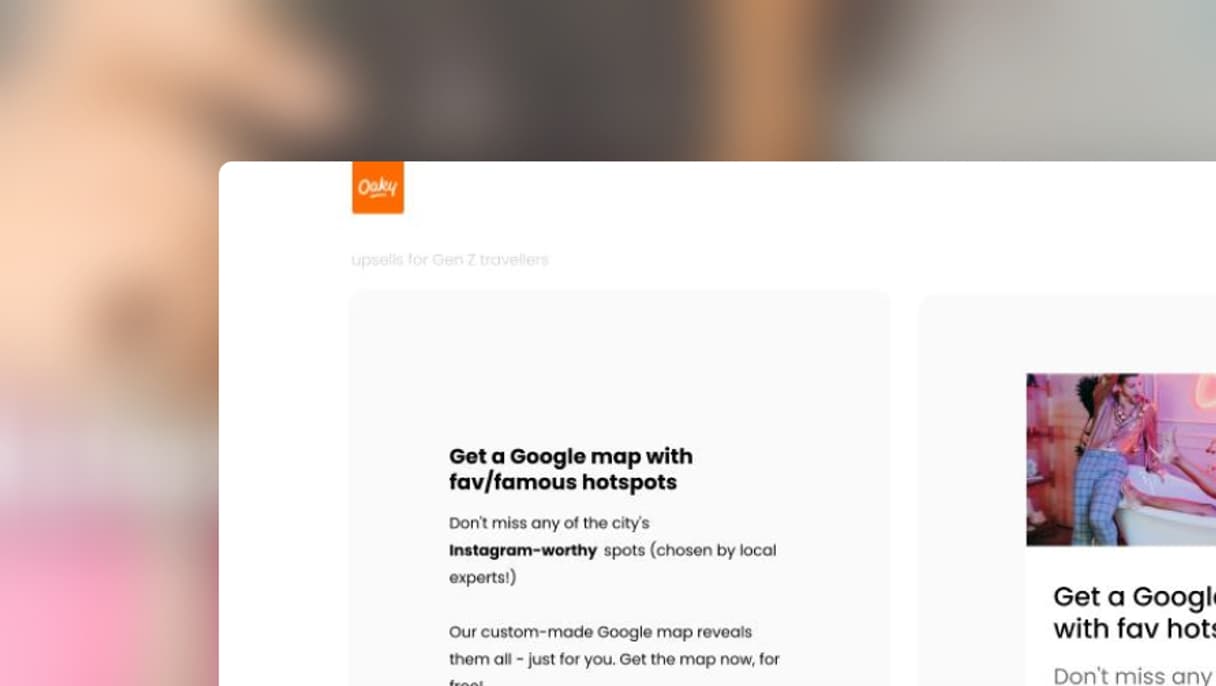12 Types of hotel guests and how to delight them
Oaky
•

To ensure stellar service at your hotel and consistent business growth, understanding the types of hotel guests you cater to is key. With personalization becoming a must, it’s crucial that you segment your audience to meet guest expectations and create the right experiences for each guest persona.
Moreover, understanding your typical guest and their wants and needs gives you a powerful edge in your marketing efforts, making it easier to attract your ideal guest.
To simplify this fundamental task for you, we’ve outlined the 12 most common types of hotel guests and their expectations and preferences so you can tailor your offerings to their unique needs.
Why do you need to know the types of hotel guests?
While you might be attracting various types of guests, pinpointing your ideal guest is crucial for your hotel's success. By diving into the commonalities and preferences of your guests, you can develop an ideal guest profile to serve you as your "guiding star."
This profile will steer your marketing, distribution, and revenue management strategies. From social media messaging to personalized experiences, understanding your target audience will make your efforts more focused.
What Are the Most Common Hotel Guest Types?
Depending on your current hotel’s strategy and amenities, you might be already catering to one of the following guest personas:
Leisure travelers
Business travelers (Bleisure travelers)
Wellness travelers
Luxury travelers
Family travelers
Green travelers
Digital nomads
Baby boomers
Millennials
Gen Z
Solo travelers
Let’s take a deeper look at each of these guests’ preferences and expectations to shape the stays they are looking for.
1. Conventional leisure travelers
Who they are: Whether event attendees or a couple traveling to explore local attractions, leisure travelers’ reason for traveling is purely recreational. They can span a wide age range, from young adults to older travelers. However, their goal is common — to escape daily routines, relax, and have a good time.
They can vary from budget-conscious travelers to luxury seekers. But they are usually on the lookout for good value for money and are not opposed to spending more on unique and memorable experiences.
What they expect and how to delight them:
Seek comfortable, well-located hotels offering a variety of attractions nearby, such as beaches, cultural sites, shopping areas, and dining options.
Value room features like a good view, balcony, and on-site amenities.
Appreciate a selection of on-site recreational facilities like a swimming pool and hotel bar.
Expect cleanliness and convenience.
Appreciate local recommendations (a map with local hotspots and hidden gems is a great treat for them).
Open to wellness experiences and are likely to enjoy sightseeing tours or unique dining options.
How to attract leisure guests:
Leverage social media and influencer partnerships to showcase your hotel's unique aspects, such as amenities, scenic views, and special events.
Design enticing offers that combine accommodation with local attractions, dining experiences, or special events. For example, create weekend getaway packages.
Highlight your hotel's features on OTA listings. Mention if your property is “10 minutes away from the beach,” “close to the city center,” or “close to the airport,” making your accommodation an easy choice for them.
2. Business travelers
Who they are: Their primary reason for travel is work-related, often involving meetings, conferences, or client visits. With tight schedules, business travelers don’t usually have time for sightseeing and return to their hotel rooms for a good night’s sleep.
What they expect and how to delight them:
They value efficiency and will be grateful for services that will make their stay easier and help them save time. These might include access to laundry and ironing service, transport, available parking, customized room service, and a decent hotel restaurant.
As they’re not on vacation, they would also like to continue with their regular routine, which might include eating healthily and exercising daily.
Ensure that the room has a well-lit area with multiple charging points that they can use as their physical office space.
Include a list of nearby co-working spaces or coffee shops that are conducive to meetings. Internet access, preferably free and speedy, is also a must.
How to attract them:
Promote your well-equipped meeting rooms, business centers, and co-working spaces with all the necessary amenities.
Develop attractive loyalty programs tailored to business travelers. Offer perks such as room upgrades, free nights, or exclusive services.


3. Health and wellness travelers
Who they are: Wellness travelers’ reason for visiting a destination is to boost their health. For some, promoting their physical health will be more important, while other travelers in this category will pay more attention to their mental well-being. Whichever area they decide to focus on more, it’s all about self-care. These guests often travel alone so that they can make the most of their “me time”.
What they expect and how to delight them:
Expect an environment that supports a wide range of fitness activities, but also a place where they can meditate and practice mindfulness.
Value activities such as yoga, meditation, and outdoor adventures.
Often prioritize eco-friendly and sustainable practices.
Seek personalized wellness experiences tailored to individual health goals.
They prefer longer stays to benefit fully from wellness programs.
Appreciate healthy dining options and menus that include organic, locally sourced ingredients, vegan, vegetarian, and gluten-free options.
How to attract wellness travelers:
Offer special packages that combine accommodation with wellness activities, spa treatments, and healthy meals.
Collaborate with wellness influencers, health bloggers, and wellness travel agencies to reach your target audience. Highlight success stories and testimonials from previous wellness guests.
Host wellness retreats, workshops, and events featuring renowned wellness experts.
Implement sustainable practices such as eco-friendly toiletries, energy-efficient lighting, recycling programs, and organic bedding.
4. Luxury travelers
Who they are: Luxury travelers are ready to splurge on accommodation and exclusive experiences. They’re generally between 30-60 years old, high-income individuals, executives, or affluent professionals who usually travel as couples and know what they want.
What they expect and how to delight them:
On the lookout for hotels that offer exceptional service, high-end amenities, attention to detail, high-quality designs, and aesthetics while valuing comfort and convenience.
They seek unique experiences, exclusive dining experiences, and private tours and are often interested in cultural, adventurous, or wellness activities.
Prioritize privacy and personalized services.
Enjoy fine dining, premium wines, and gourmet experiences.
Often loyal to high-end brands and properties with strong reputations.
How to attract luxury guests:
Maintain a polished and engaging online presence. Highlight the luxury aspects of your hotel rooms through high-quality visuals and detailed descriptions.
Collaborate with luxury travel agencies, influencers, and brands to reach affluent audiences. Showcase partnerships with high-end brands and exclusive events.
Develop and promote loyalty programs that offer exclusive benefits and rewards for repeat luxury travelers.
Ensure a high level of privacy and security, offering options like private villas, secluded suites, and secure transportation services.

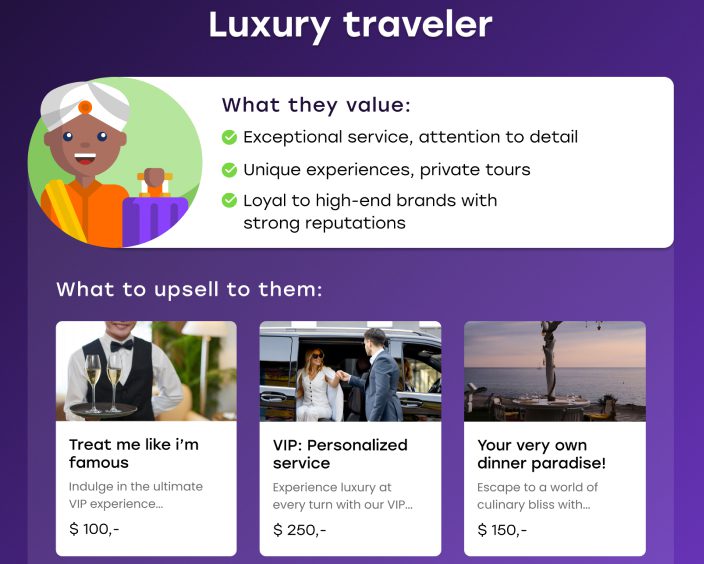
5. Family travelers
Who they are: Many family travelers are from the millennial generation. That said, there’s also an increase in multigenerational travel. So, nowadays, your typical group of family travelers can include members from multiple generations, like grandparents, cousins, and other relatives.
What they expect and how to delight them:
They look for spacious hotel rooms with enough space for everyone, including separate sleeping areas.
Facilities such as cribs, high chairs, kid-friendly toiletries, and childproofing measures in the room and throughout the property are a must.
Value menus that cater to both adults and children, including healthy choices
Appreciate access to laundry services or self-service laundry machines.
How to attract family travelers:
Create and promote family packages that include discounts, free meals for kids, or tickets to family-friendly attractions.
Highlight family-friendly amenities and services on your website and OTA listings with dedicated sections and appealing visuals.
Collaborate with family travel influencers to showcase your hotel on social media and blogs.
Work with travel agencies specializing in family travel to promote your hotel to their clients.
Highlight that you offer babysitting services to give parents some relaxation time.
Organize activities such as a family game night, arts and crafts sessions, cooking classes, or nature walks that families can enjoy together.
6. Green travelers
Who they are: Green travelers like to follow the same sustainable lifestyle that they implement at home when they hit the road. This means that they will keep in mind the impact that their travel plans have on the physical environment.
What they expect and how to delight them:
Highlight the use of green building materials, energy-efficient lighting, and eco-friendly heating/cooling systems in your hotel.
Use biodegradable, non-toxic cleaning products and toiletries.
Provide electric vehicle charging stations, bike rentals, and public transportation cards.
Offer farm-to-table dining options, vegan and vegetarian menus, and cooking classes focused on sustainable food.
Provide options for guests to offset their carbon footprint from their stay, such as “Skip daily housekeeping.”
Equip rooms with bamboo or organic cotton linens, recycled paper products, and refillable toiletry dispensers.
How to attract green travelers:
Feature your eco-friendly practices prominently on your website, OTA listings, social media, and marketing materials.
Display any green certifications or awards your hotel has received to build credibility.
Share stories, tips, and behind-the-scenes looks at your sustainability practices on social media to engage with eco-conscious travelers.
Be transparent about your sustainability efforts and progress through regular updates and reports.
Collaborate with environmental organizations and promote your partnership to show your commitment to sustainability.
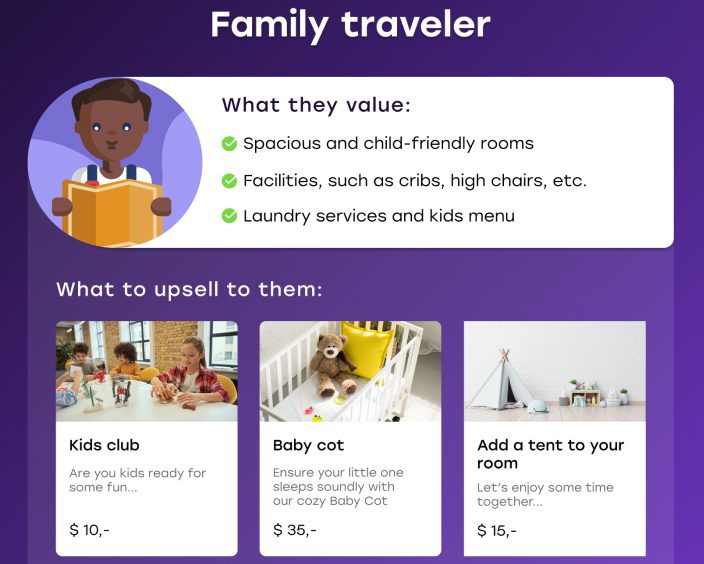

7. Backpackers
Who they are: These types of travelers are more budget-conscious than other hotel guests and travel with small luggage. Being more price-sensitive means that these guests are ready to sacrifice comforts and opt for less sophisticated stays to save costs.
What they expect from their stay: Backpackers aim to visit and explore as many places as possible, immersing themselves in genuine local experiences. They are curious about local communities, cuisine, and experiences and look for like-minded individuals to connect with during their stays. This is what you can do to delight them:
Create vibrant common areas like lounges, game rooms, or rooftop terraces where travelers can socialize.
Provide detailed local guides or maps and offer advice on must-see attractions, budget-friendly eateries, and hidden gems.
Offer free Wi-Fi and access to a well-equipped communal kitchen and laundry facilities.
Provide secure lockers or storage solutions for valuables and luggage.
Host events such as barbecues, game nights, or city tours to encourage interaction among guests.
How to attract backpackers:
Offer special rates, discounts for extended stays, and budget packages to appeal to cost-conscious travelers.
Use platforms like Instagram, Facebook, and travel forums to showcase your hostel’s atmosphere, events, and local tips.
Emphasize common areas, social events, and activities where backpackers can meet other travelers.
Provide budget-friendly add-ons like airport transfers, guided tours, or rental services (e.g., bikes or gear)
Partner with local businesses for discounts or collaborations, and highlight these connections to backpackers looking for authentic experiences.
8. Digital nomads
Who they are: Digital nomads, more often than not, work remotely. This means that they can work from any location as long as they have a place for their laptop, fast Wi-Fi, and some peace and quiet.
They typically travel with a number of electronic devices, but as for companions, that’s where it stops. It’s rare for them to travel in a big group.
What they expect from their stay: The needs and expectations of digital nomads are actually pretty straightforward.
They need fast Wi-Fi that they can count on (preferably free), co-working spaces, and a relatively flexible environment that can double up as a place where they can work and unwind.
How to attract digital nomads:
Offer special rates or packages for extended stays to appeal to digital nomads who prefer longer-term accommodations.
Share content that highlights your hotel's workspace features, networking opportunities, and the local community on platforms like LinkedIn, Instagram, and Facebook.
Partner with influencers and bloggers who focus on the digital nomad lifestyle to showcase your hotel’s appeal.
Ensure your property is featured on websites and forums that cater to digital nomads, such as Nomad List or Remote Year.
9. Boomer travelers
Who they are: Hotel guests from the boomer generation refer to guests born between 1946 and 1964. They’ve already retired or will be retiring soon.
They often travel several times per year, and in many instances, they can also afford to spend more. They also usually use hotel loyalty programs to make their bookings and travel as couples or in bigger groups.

What they expect and how to delight them:
While many of them have a bigger budget, they’re still on the lookout for loyalty programs to get reliable service. Also, unlike younger travelers who might still try to combine leisure with business, guests from this generation are focused only on having a good time. It means they dedicate more time to connecting with locals, exploring the sights, and eating authentic dishes. A few other ideas include:
Ensure rooms are equipped with high-quality bedding, easy-to-use climate controls, and comfortable seating.
Offer wellness amenities such as spas, discounted spa treatments, fitness centers, and relaxation areas to support health and well-being.
Provide in-room facilities like coffee makers and assistance with technology, such as help with Wi-Fi connections, using the TV remote, or other tech needs.
Offer clear signage, accessible entrances, and well-lit pathways to ensure ease of movement.
Offer concierge services or assistance to help with planning activities, transportation, or special requests.
How to attract boomers:
Use traditional marketing channels like print ads, magazines, and direct mail that may resonate more with baby boomers.
Utilize platforms like Facebook, which has a strong baby boomer user base, to share engaging content and promotions.
Highlight the comfort, cleanliness, and quality of your accommodations in your marketing materials.
Create a straightforward and easy-to-use loyalty program that offers tangible rewards without complex rules or extensive tracking.
10. Millennials
Who they are: Travelers who fall into this age group were born between 1980 and 1995. As they’re still far from retirement, their work schedule is still one of their primary focus areas, which leaves them with less time for vacations.
This means that millennials typically take shorter vacations. That said, they’re open to the idea of taking a “bleisure trip”. If they need to travel for work, they might extend their business trip by a few days so that they can explore the city.
Millennials and Gen Z constitute the largest share of modern travelers. About 60% of hotel bookings in 2024 are expected to be made by Millennials and Gen Z.
What they expect and how to delight them:
Millennial travelers value experiences. They prefer unique vacations that allow them to explore the local culture, interact with the locals, and enjoy new experiences. Here are a few other points for you to keep in mind when catering to millennials:
Millennials look for modern, stylish rooms with comfortable, aesthetically pleasing designs.
Appreciate unique amenities like rooftop bars, trendy lounges, and modern fitness centers.
Prefer businesses that support social causes and engage in ethical practices.
Appreciate personalized recommendations for local dining, attractions, and experiences.
Expect advanced technology, such as mobile check-in/check-out, digital room keys, and high-speed Wi-Fi.
Expect prompt and responsive customer service through various channels, including chat, phone, and social media.
How to attract millennials:
Ensure your website and booking process are mobile-optimized for easy navigation and reservations on the go.
Maintain an active presence on platforms like Instagram, Facebook, and TikTok, sharing visually appealing and engaging content.
Encourage guests to share their experiences and feature their photos and reviews on your social media channels.
Collaborate with travel influencers and bloggers who can showcase your hotel to their followers.
Offer prompt and friendly customer service, available through multiple channels, including chat, email, and phone.
Provide opportunities for guests to experience local culture, such as guided tours, culinary experiences, and cultural events.
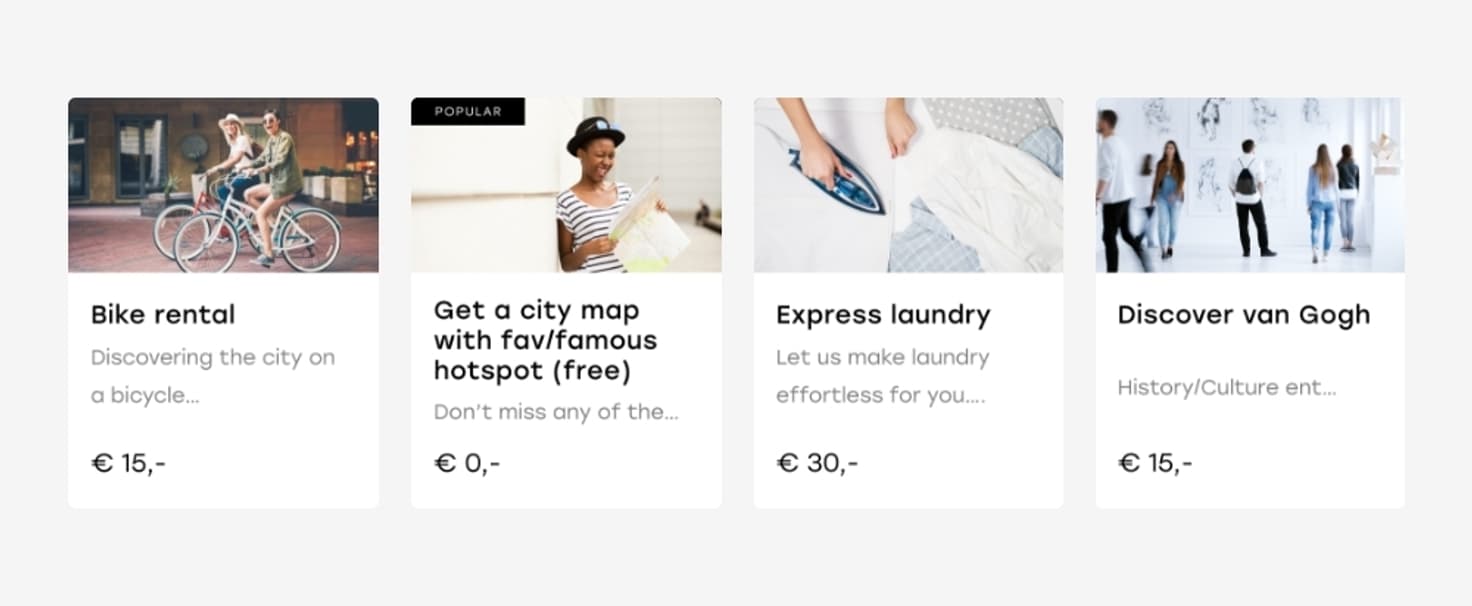
11. Gen Z
Who they are: Travelers in this age group were born between 1995 and the mid-2000s. While they’re younger than millennials, they’re similar to them in the sense that they also prefer shorter vacations over longer getaways.
Overall, they’re more price-sensitive, especially considering that many of them are still either students or only at the start of their careers. However, if an activity promises to deliver a truly authentic experience, they’re willing to exceed their budget.
What they expect from their stay: Just like millennial travelers, your Gen Z guest values experiences.
That said, unlike their millennial counterparts, who will still be happy to visit more traditional attractions, Gen Z travelers crave newer experiences that are even more authentic. They also prefer dining out at local restaurants and highly appreciate food experiences. In fact, according to Get Your Guide, Gen Z (65%) and Millennials (63%) are more likely than other generations to schedule food-related tours. Gen Zers also value private rooms, amenities like A/C, and reliable Wi-Fi, which are even better if they help promote sustainability.
How to cater to Gen Z travelers: If you want to attract hotel guests from this generational group, you’ll need to create the right positioning of your hotel brand in your marketing campaigns.
Unlike guests from the boomer generation whose loyalty you can “buy” with promos, points, and perks, Gen Zers appreciate personalization.
Make sure your social media content revolves around unique experiences (especially food-related ones).
Partner with travel influencers on Instagram or TikTok, too.
While they’re tech-savvy, given their young age, they aren’t necessarily experienced travelers. So, be sure to include travel tips to help with transportation and ensure they stay safe.
Provide prompt and friendly customer service through various channels, including chat, email, and phone.
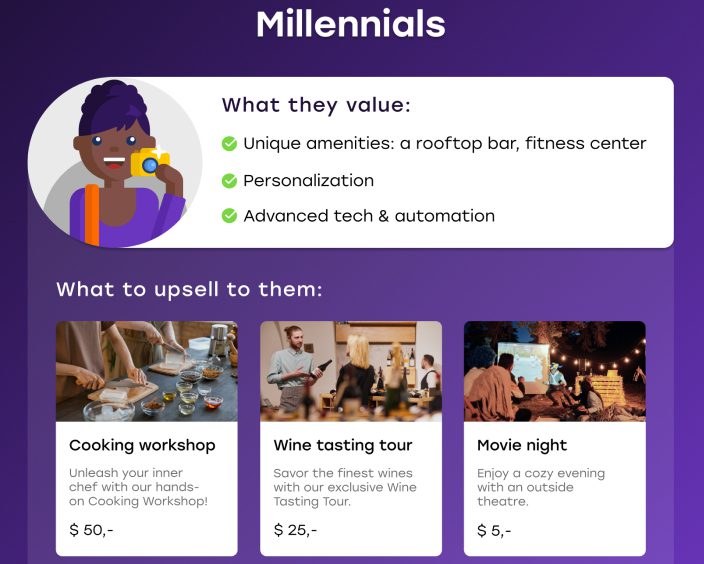
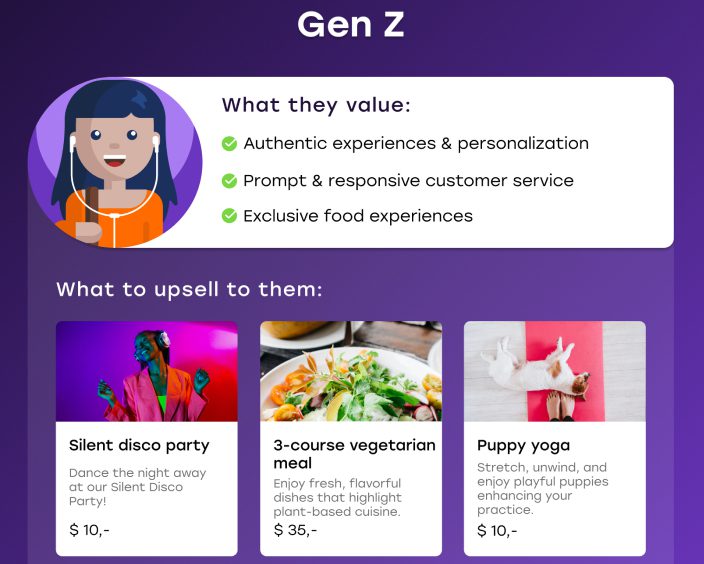
12. Solo travelers
Solo travelers are individuals who choose to explore destinations on their own, seeking personal growth, adventure, and independence. They often prioritize flexibility and spontaneity in their travel plans, allowing them to fully immerse themselves in local cultures and experiences. These travelers value safety, social opportunities, and unique experiences tailored to their individual interests.
What they expect and how to delight them:
Solo travelers prioritize safe accommodations in secure locations.
They expect 24/7 security, well-lit premises, and reliable information on safe local practices and areas.
They appreciate communal spaces to meet and interact with other travelers, group tours, and social events organized by the hotel.
Value detailed guides and maps of the local area with suggestions for solo-friendly activities and attractions.
Appreciate rental services for bikes, scooters, or cars to facilitate independent exploration.
How to attract solo travelers:
Promote your hotel's security measures, such as 24/7 surveillance, secure entrances, and in-room safes.
Emphasize the safety of your hotel's location, including well-lit surroundings and proximity to safe public transportation.
Maintain an active social media presence, sharing tips for solo travelers, guest testimonials, and highlights of local attractions.
Encourage solo travelers to leave positive reviews and share their experiences online to attract more solo guests.
Develop loyalty programs with benefits that appeal to solo travelers, encouraging repeat business.
Putting your knowledge about different hotel guest types into practice
Gathering data about your most common hotel guests is essential for creating tailored offers for each segment. From digital nomads to families involved in multi-generational travel, including members from the boomer, millennial, and Gen Z generations, identifying and understanding the needs of potential guests is crucial.
By knowing who your most common types of hotel guests are and understanding their unique needs and requirements, you can define the most lucrative segments. Armed with this knowledge, you can build your hotel’s marketing strategy around your ideal guest, offering certain amenities and impeccable service to increase guest satisfaction.
This is where Oaky becomes invaluable. Hotel upsell software like Oaky can help you connect the two dots: your guest segments and upselling offers. Through the Segmentation feature, you can personalize your offerings so that your guests see only deals relevant to them. This shows that you’re mindful of their specific needs, helping you create a memorable guest experience for all.


